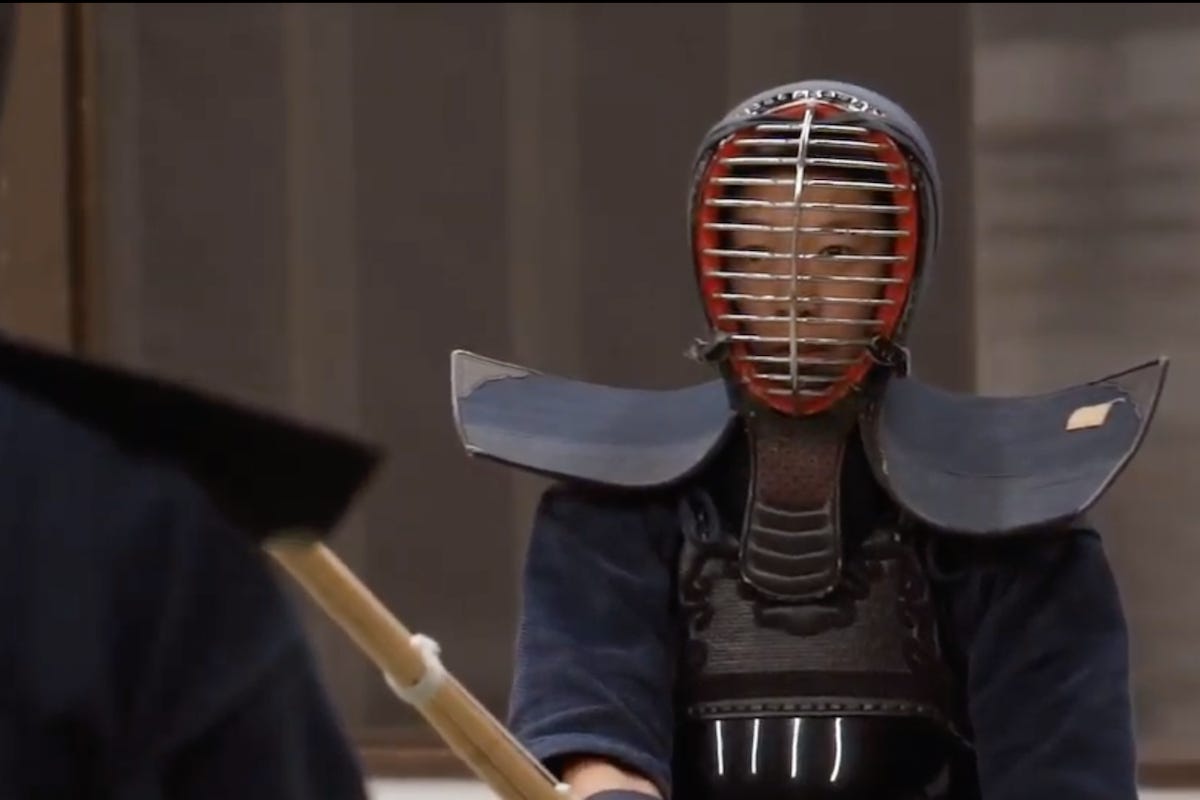Not for the sake of the beholder
In the deep mountains the cherry blooms / Out of the sincerity of its heart

Tuesday and Friday nights are Kendo nights. In a warmly lit dojo at Chozen-ji, I do zazen (meditation) with a small class of Kendo students and teachers for 90 minutes. Then I lead our Kendo class warmups. Master swordsman, Zen master and Chozen-ji founder Omori Sogen once said if you do these vigorous stretches and exercises daily, you'll live to be 100. One of them involves flopping on the floor like a fish.
We practice the Hojo, a 500-year-old Japanese sword form—one student the shin or mind, the other the kage, shadow. In a choreographed kata, we advance, yell and swing our swords through all four seasons of the year. In spring, the sword rises over our heads like the first grass breaking through the snow. The burning wind of summer gives way to falling leaves that slice back and forth through the autumn air. Winter is not so much about how one swings a sword in the cold of winter, but—as with all the seasons in the kata—the swordsman becoming winter, the season itself.
Then, we do Kendo. Apparently, the average spectator thinks that all 125 pounds and 5'4" of me is formidable and intimidating when I do Kendo. The Roshi and Senseis think, even in my most ferocious-feeling of moments, that I am at least sincere.
Sincerity is an important trait in Japan and at Chozen-ji. It doesn't just mean seriousness, or approaching something with courtesy or respect. In Japan, sincerity has value in itself, even if the object of one's sincerity—the idea one is sincere in espousing, for example—does not. It is something one knows when they see it. But it can be hard to describe exactly.
Kendo class in the dojo ends at 9pm, but then class continues—a kind of verbal or social Kendo—in the tea house built for Omori Sogen when he would visit from Japan. It was in the last post-Kendo class that Teshima Sensei—our 7th Dan kendo master descended from samurai—offered a different understanding of the Japanese word that is often translated as 'sincerity', shin ken.
The direct translation of shin ken, he said, is "live blade". Live as in sharp enough to kill. It is a vivid image—to approach whatever you're doing as if you're doing it with a live blade in your hands.
It fits with how we approach Zen training at Chozen-ji. The 24-hours-a-day-7-days-a-week approach here, we often say, makes it feel as though there is always a sword at your throat, and nowhere to relax and hide.
Shin ken as sincerity reduces the chance you'll misinterpret "sword at your throat" as martial arts machismo, hazing or just raw aggression. You can participate in a tea ceremony that is so refined and sincere that you feel invisibly embraced to the point of tears. Wielding a calligraphy brush over a wooden board, knowing that you have but one chance to get it right, can feel like swordwork with a deadly, live blade. And that sincerest of feelings can come through the calligraphy to the viewer, years after the person who held the brush is gone.
I'm not sure how well people in the West know sincerity. Some mistakenly call it authenticity. The fact that I learned strategies to seem more authentic in business school already pushes authenticity down way below sincerity in my book.
Sincerity can only come from the heart. It's like vulnerability, but without the emphasis on weakness and without the performance of vulnerability for another. It involves a little ego death, but still shimmers with liveliness. It is hard to define, but—like seeing Chozen-ji for the first time as you drive down our long jungle road—you'll know it when you see it.
If you liked this essay, please hit the ❤️below to help get Substack to share my newsletter with their readers!


